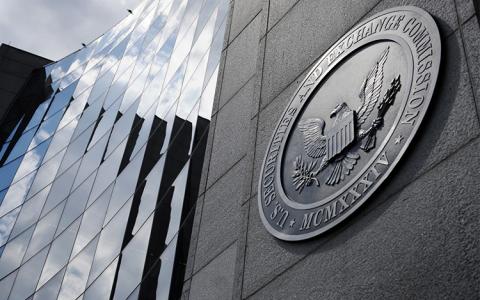
Robinhood Markets and Citadel Securities had starring roles in the GameStop Corp. trading frenzy that rocked financial markets this year. Now, they have among the most to lose as U.S. regulators’ threaten a clean up.
In his most revealing comments so far about how Washington might respond to the meme-stock mania, Securities and Exchange Commission Chairman Gary Gensler shined a spotlight on online brokerages and market makers that dominate the business of executing retail investors’ equity orders.
He said popular apps like Robinhood’s exploit game-like features to keep customers trading -- an investing strategy that over time can eat into returns. And Gensler raised concerns that a deluge of equity transactions are being routed through Citadel Securities and a few other massive players, which he said threatens “healthy competition.” In remarks prepared for a Thursday House hearing, the SEC chief made clear that such issues will be a focus as the regulator examines whether tougher rules are needed.
The task ahead for the SEC is daunting. Many of its regulations were approved more than a decade ago -- long before social media, real-time trading and smartphones transformed the stock market. And because of the stakes involved, the agency is sure to face an onslaught of pressure from Capitol Hill and intense lobbying by Wall Street.
Read More: Family Offices, Payments to Brokers Are in Democrats’ Crosshairs
“Many of our regulations were largely written before these recent technologies and communication practices became prevalent,” Gensler said in testimony released Wednesday for his appearance before the House Financial Services Committee. “We need to evaluate our rules, and we may find that we need to freshen up our rule set.”
Gamification Review
As a first step, Gensler said he has asked SEC staff to seek public comment on “gamification,” a term describing video game like features that critics have most closely associated with Robinhood. The feedback the regulator receives will inform potential policy changes.
He also said the agency will step up its scrutiny of payment for order flow -- the practice in which Citadel Securities, Virtu Financial Inc. and other firms pay brokers for the right to execute customers’ orders. In addition, Gensler said the SEC plans to review whether it should boost investment funds’ disclosures of short sales and swap positions that are linked to stocks, a topic that has drawn attention since the March implosion of Archegos Capital Management.
Read More: A Glossary to Understand the Collapse of Archegos
Financial Industry Regulatory Authority President Robert Cook, who leads the Wall Street-funded watchdog that polices brokerages, and Depository Trust & Clearing Corp. President Michael Bodson will testify alongside Gensler.
Thursday’s hearing is the third that the House panel is holding on GameStop. Retail investors banded together on social media platforms in January to drive the video game retailer to astronomical levels, badly hurting hedge funds that were betting against the stock in the process. The episode fueled a Main Street conquering Wall Street narrative that became a topic of headlines worldwide.
Much of the trading took place on Robinhood, which enraged customers by temporarily halting them from buying additional GameStop shares because the high volume overwhelmed the brokerage’s required capital buffers. Citadel Securities, which executed many of the orders along with Virtu, was dragged into the controversy, with billionaire founder Ken Griffin having to testify before the House committee in February. The SEC is working on a report about GameStop that it has pledged to release soon.
Following Rules
”We look forward to engaging with the SEC as they consider potential rules in these areas,” said Robinhood spokeswoman Jacqueline Ortiz Ramsay. Virtu spokesman Andrew Smith said the firm is “supportive of changes that enhance the investing experience for retail investors.”
A Citadel Securities spokesman referred to Griffin’s February testimony when he said: “We simply play by the rules of the road.” Griffin added that payment for order flow is approved by the SEC and is customary in the industry. “If they choose to change the rules of the road -- we need to drive on the left side versus the right side -- that’s fine with us,” he said.
Robinhood, which is planning an initial public offering later this year, relies on payments for order flow for a big chunk of its revenue. Retail brokerages and market makers have aggressively defended the practice, arguing that it allow investors to trade stocks for free. But consumer advocates and financial industry critics say the payments trigger conflicts that could prompt brokerages to focus on profits rather than serving their customers’ interests.
Read More: The Market Plumbing Behind the Meme Stock Frenzies
In his prepared remarks, Finra’s Cook said the regulator is “investigating whether its broker-dealer members complied with existing rules” during the wild January trading, and is considering strengthening its standards. The watchdog looks forward to working with the SEC on its review of payment for order flow and is evaluating whether new rules are needed for game-like trading features, he added.
Archegos Implosion
Gensler also discussed Archegos, the family office run by Bill Hwang. The firm collapsed after making undisclosed derivatives bets tied to stocks, with its banking counterparties suffering billions of dollars in losses. Gensler said the SEC has authority to extend its disclosure rules to swaps.
“At the core of that story was Archegos’ use of total return swaps based on underlying stocks, and significant exposure that the prime brokers had to the family office,” he said.
This article originally appeared on Yahoo! Finance.



